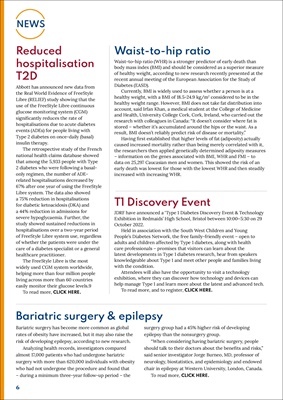
6
NEWS
Reduced
hospitalisation
T2D
Abbott has announced new data from
the Real World Evidence of FreeStyle
Libre (RELIEF) study showing that the
use of the FreeStyle Libre continuous
glucose monitoring system (CGM)
significantly reduces the rate of
hospitalisations due to acute diabetes
events (ADEs) for people living with
Type 2 diabetes on once-daily (basal)
insulin therapy.
The retrospective study of the French
national health claims database showed
that among the 5,933 people with Type
2 diabetes who were following a basalonly
regimen, the number of ADErelated
hospitalisations decreased by
67% after one year of using the FreeStyle
Libre system. The data also showed
a 75% reduction in hospitalisations
for diabetic ketoacidosis (DKA) and
a 44% reduction in admissions for
severe hypoglycaemia. Further, the
study showed sustained reductions in
hospitalisations over a two-year period
of FreeStyle Libre system use, regardless
of whether the patients were under the
care of a diabetes specialist or a general
healthcare practitioner.
The FreeStyle Libre is the most
widely used CGM system worldwide,
helping more than four million people
living across more than 60 countries
easily monitor their glucose levels.9
To read more, CLICK HERE.
Bariatric surgery & epilepsy
Bariatric surgery has become more common as global
rates of obesity have increased, but it may also raise the
risk of developing epilepsy, according to new research.
Analyzing health records, investigators compared
almost 17,000 patients who had undergone bariatric
surgery with more than 620,000 individuals with obesity
who had not undergone the procedure and found that
- during a minimum three-year follow-up period - the
surgery group had a 45% higher risk of developing
epilepsy than the nonsurgery group.
"When considering having bariatric surgery, people
should talk to their doctors about the benefits and risks,"
said senior investigator Jorge Burneo, MD, professor of
neurology, biostatistics, and epidemiology and endowed
chair in epilepsy at Western University, London, Canada.
To read more, CLICK HERE.
Waist-to-hip ratio
Waist-to-hip ratio (WHR) is a stronger predictor of early death than
body mass index (BMI) and should be considered as a superior measure
of healthy weight, according to new research recently presented at the
recent annual meeting of the European Association for the Study of
Diabetes (EASD).
Currently, BMI is widely used to assess whether a person is at a
healthy weight, with a BMI of 18.5-24.9 kg/m2 considered to be in the
healthy weight range. However, BMI does not take fat distribution into
account, said Irfan Khan, a medical student at the College of Medicine
and Health, University College Cork, Cork, Ireland, who carried out the
research with colleagues in Canada: "It doesn't consider where fat is
stored - whether it's accumulated around the hips or the waist. As a
result, BMI doesn't reliably predict risk of disease or mortality."
Having first established that higher levels of fat (adiposity) actually
caused increased mortality rather than being merely correlated with it,
the researchers then applied genetically determined adiposity measures
- information on the genes associated with BMI, WHR and FMI - to
data on 25,297 Caucasian men and women. This showed the risk of an
early death was lowest for those with the lowest WHR and then steadily
increased with increasing WHR.
T1 Discovery Event
JDRF have announced a 'Type 1 Diabetes Discovery Event & Technology
Exhibition in Redmaids' High School, Bristol between 10:00-5:30 on 29
October 2022.
Held in association with the South West Children and Young
People's Diabetes Network, the free family-friendly event - open to
adults and children affected by Type 1 diabetes, along with health
care professionals - promises that visitors can learn about the
latest developments in Type 1 diabetes research, hear from speakers
knowledgeable about Type 1 and meet other people and families living
with the condition.
Attendees will also have the opportunity to visit a technology
exhibition, where they can discover how technology and devices can
help manage Type 1 and learn more about the latest and advanced tech.
To read more, and to register, CLICK HERE.